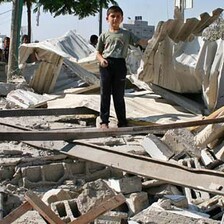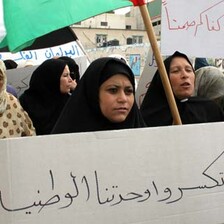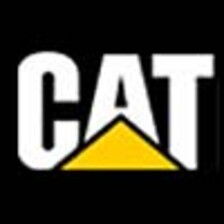The Electronic Intifada 22 March 2005
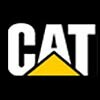
Take the case of Caterpillar. Without selling a single bomb, gun or F16 fighter, Caterpillar has been supplying the Israeli military with its “key weapon”, in the words one Israeli commander, in its illegal and brutal occupation of Palestine. In the words of the United Nations Special Rapporteur on the right to food, Caterpillar’s D-9 bulldozers have been responsible for destroying “agricultural farms, greenhouses, ancient olive groves.. numerous Palestinian homes and sometimes human lives”.
The toll of human lives destroyed with these machines is truly horrifying. During the last 4 years the Israeli army has flattened over 4,000 homes - rendering tens of thousand homeless, traumatised and impoverished. Israel claims that these demolitions are punitive actions against suspected terrorists. While such punishment is anyway illegal under international humanitarian law, a recent report by Israeli human rights organisation B’Tselem found that in half of all cases there was nothing linking the houses to terrorism.
Palestinians are currently suffering from poverty levels comparable with some of the poorest parts of sub-Saharan Africa - in the words of the United Nations it bears the “effects of a terrible natural disaster”, though one created by people and politics. A key source of this poverty is the destruction of agricultural land, the only possible source of livelihood open to many Palestinians. Caterpillar bulldozers have been used to rip up extensive areas of cultivated land, destroying thousands of olive and citrus trees. The destruction of wells, storage tanks and water pumps has several limited access to drinking water.
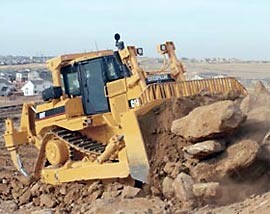
A 50-ton Caterpillar D9T bulldozer, the type that crushed Rachel Corrie. This and similar Caterpillar models, sold to the Israeli government and used to demolish Palestinian homes, are the target of increasing protests.
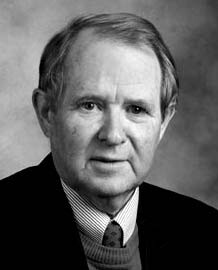
John Dugard.
But perhaps the bulldozers are best described by the experiences of two young people on either side of the Occupation. Israeli Army D9-operator Moshe Nissim describes his experience of Jenin: “I had no mercy for anybody. I would erase anyone with the D9 … when I was told to demolish a house, I took the opportunity to bring down some more houses”. His unit was cited for outstanding service.
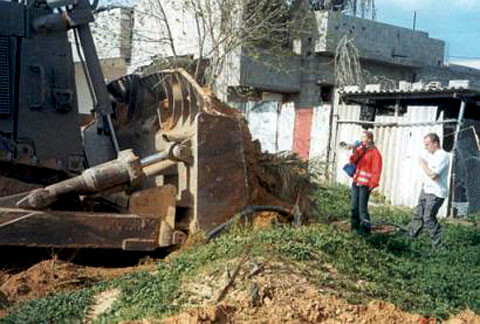
Rachel Corrie (L) and Nick (R) oppose the potential destruction of this home (to the west of the Doctor’s home where Rachel was killed). In the instance pictured, the Caterpillar D-9 bulldozer did not stop and Rachel was pinned between the scooped earth and the fence behind her. On this occasion, the driver stopped before seriously injuring her. Picture taken between 3:00-4:00PM, 16 March 2003, Rafah, Occupied Gaza. (Photo: Joseph Smith/ISM Handout).
On the other side was 23-year-old US peace activist Rachel Corrie. On an International Soliarity Movement demonstration Rachel stood in front of a Palestinian home, trying to prevent its demolition. The D9 driver initially dumped sand on Rachel, later driving over her as demolition proceeded. Rachel died of her injuries.

Jim Owen, CEO of Caterpillar.
The answer is apparently yes. It seems incredible that a company so tarnished by accusations can continue to maintain in public remarks that it is “doing well by ‘doing good’ around the world”. Amongst the gems of irony lifted from Caterpillar’s Code are that “We believe that our success should also contribute to the quality of life and the prosperity of communities”.
Such is the fantasy world of ‘corporate social responsibility’, a multi-million dollar industry in its own right, which attempts to replace social consciousness with public relations. So concerned is Caterpillar with “doing good” that when UN Special Rapporteur Jean Ziegler wrote to Jim Owens in May 2004 expressing his concerns that Caterpillar may be complicit in violating the Palestinian’s right to food enshrined in the International Covenant on Economic, Social and Cultural Rights, Mr Owens did not even bother to reply.
Little wonder he was unperturbed when Caterpillar openly advertises its bulldozers in military conflict zones such as Afghanistan and Iraq. Indeed many bulldozers sent to Israel are actually paid for by the generosity of the US taxpayer as part of the US’s substantial contribution to Israel’s military.
For these reasons, War on Want is calling on its supporters and members of the public to boycott Caterpillar products for as long as the company’s involvement in the Occupied Territories continue. While few of our supporters are likely to be purchasing new bulldozers this year, Caterpillar boots, caps, t-shirts and other clothes stock the shelves of Dolcis, Barratts, River Island, John Lewis and Schuh.
But ultimately corporate complicity in the sort of grave human rights violations witnessed in the Occupied Palestinian Territories will only halt when corporate behaviour is regulated, not by voluntary Codes of Conduct written by over-paid PR consultants, but by an international system of laws, accountable to people.
Related Links
For more information and to join War on Want’s campaign to rein in global corporations go to: waronwant.org/?lid=9721 or to order a print copy of the report, e-mail globaljustice@waronwant.org.

